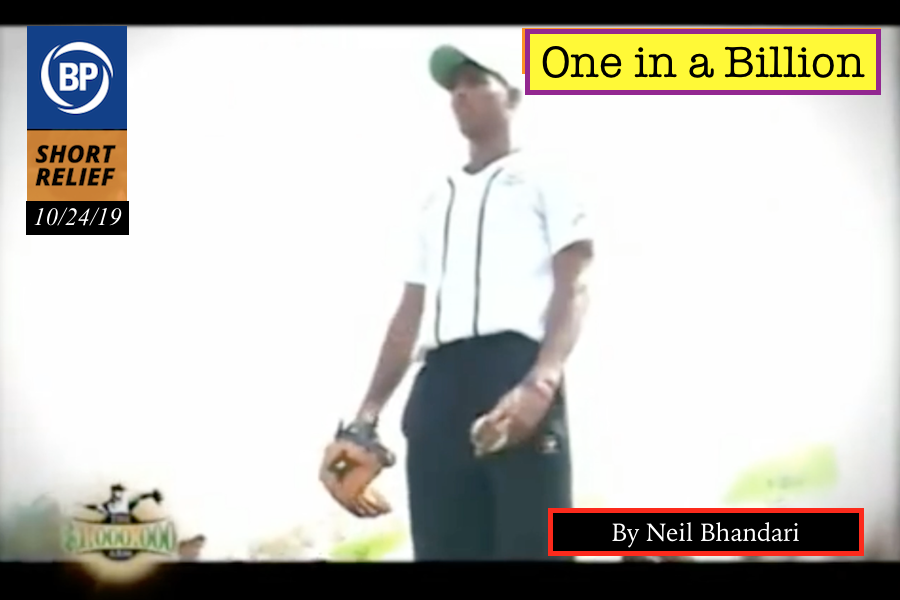
“By the time you make it, there will probably be a lot of Indian baseball players.”
This is, word for word, exactly what my sister said to me one night in 1993 as we brushed our teeth at our parents’ bathroom sink while preparing for bed. At that point I was 12 years old and had made three consecutive Pony League all-star teams, the only non-coach’s son to accomplish the feat as far as my family knew. Thus, my making it to the big leagues wasn’t even a question — it was simply a matter of how many of my fellow Indians and Indian-Americans I would eventually be joining there. At that point unfamiliar with the myriad levels of college, semi-pro, and low-level professional baseball leagues and the countless numbers toiling therein, we had no meaningful context or reference point between my own games played just down the street from our suburban cul-de-sac and the ones we watched on WGN every day — and so, the direct path between those two points seemed more a likelihood than some far-flung hope.
The next couple of years did nothing to diminish that hope — there were a couple of junior high no-hitters, a few more all-star teams, the occasional call-up to the JV team as a freshman — as far as I could tell everything seemed to be on track for a Wrigley Field debut sometime around 2003. And I could only assume that any number of other first and second-generation Indian immigrant kids around the country were on that very same trajectory. But then a couple of strange things happened on the way to turning 17 — I stopped growing, and my arm started hurting. My pediatrician — my pediatrician was still my doctor at that time — ever the pragmatist laid the truth out, harsh and bare: “You’re what, 5’8”, 5’9”, you weigh 150 pounds — you’re not going to be a baseball player. So we can do a surgery that won’t make any difference, or you can rest for a few months and you’ll be able to play catch with the kids you’ll have someday.” The matter-of-factness with which he put this stood in direct contrast to the presumption and promise I’d been operating by, and just like that, my dreams of becoming the first Indian professional baseball player were dhishoom’d.
In 2008, an Indian reality show called The Million Dollar Arm led to the Pittsburgh Pirates signing Rinku Singh and Dinesh Patel, cricketers who would go on to become the first Indians to ever play professional baseball. (Their story was later made into a well-recognized but little-seen Disney movie of the same title, staring Jon Hamm.) I followed Rinku and Dinesh’s progress religiously, as they kept a shared blog chronicling the experience of learning a new sport in a new country. With each post I would hope to find news of a stellar outing or perhaps even a promotion, but alas, in fairly short order both Rinku and Dinesh flamed out, neither making it past A-ball. That was the closest anyone of Indian descent has made it to the big leagues thus far, and truly, it wasn’t very close at all.
I’m 37 years old now. If, by some miracle I had made it, my career would most likely be over by now. If I had, I would’ve been the only one. And I would still be the only one. So far. So far.

I remember Nebraska, once, or maybe it was Kentucky. There were fields and it was flat, and there were buildings with huge, boarded up windows and some trees. Those were things I had at home, too. But for some reason these ones seemed distinctly different, as if the very matter making up the grass and the brick and the wood were comprised of an unintelligible language where only the shapes of the letters felt familiar.
I remember listening to the radio through my cell phone, wishing I was somewhere else, and feeling if not comforted, then at least in stasis, assured there was indeed a baseball game being played over there, in Seattle, and that there were people there, watching it, as if to promise me the place still existed, was still peopled through the evidence of my ears alone.
One time in college, I skipped the second day of class to drive three hours to Safeco Field. I had actually driven up two days before, but I wanted to see Félix Hernández, so I decided to throw caution and my non-existent finances to the wind and let the present Be. The class itself — if I passed, if Félix won or lost that night — no idea. But I do remember going, and I remember feeling like somehow, the ritual of the whole thing was the point. I remember it felt nice to hear the sounds all blend together like one of those old nature soundscape CDs they sold at Target with the demo buttons on the display you’d press while shopping with your parents that had samples of tracks named like “Babbling Brook” or “Evening Sedona Breeze,” except here it was a guy selling caramel popcorn amidst a PA system playing deep cuts off ESPN’s Jock Jams album in between pitches.
If I said that baseball had ever provided me an escape, it would be somewhat of a lie. It’s a sentiment I hear often, and it emerges from, I would argue, two opposed tendencies in contemporary culture: on the one hand, the forces of reaction who just want to witness spectacle and athleticism free from the concerns of constitutive questions of race, class, sexuality, and anything else “invading” their favorite pastime, as if it were ever free and evacuated of said questions in the first place. The other, perhaps, would come from those who feel helpless under the weight of any number of contemporary society’s irreconcilable contradictions, looking for a narrative of hope or a promise that it all might, somehow, work out in the end.
The latter tendency, I must admit, feels more and more tenuous by the day.
I watched the final outs of Justin Verlander’s no-hitter the other day, and while I wasn’t repeatedly checking my phone for the latest update on the UK Government falling apart, Bolsonaro and the Amazon, more irregular weather in this unusual New England summer, or the path of Hurricane Dorian, I couldn’t help but feel I wasn’t fully paying attention to anything, at all, at least not with my conscious mind. The innocent presentism of that afternoon at Safeco here quickly blended into a more nefarious presentism, one in which the past of memory appeared to me as utterly out of reach alongside a future always already unfolding, a state in which tomorrow folded back into today, again and again, in a moment that suggested the coming crisis is both here and waiting up ahead, a shadow bent backwards into the day.
Soon there was a strikeout, and then a grounder to third, and Verlander was quickly celebrating his third career no hitter on the same mound he achieved his last. He was wearing a bright orange jersey, and one day he might get another, wearing gray, for his third no-no, again. Maybe I’ll still be watching, hoping for the worst and fearing for the best.
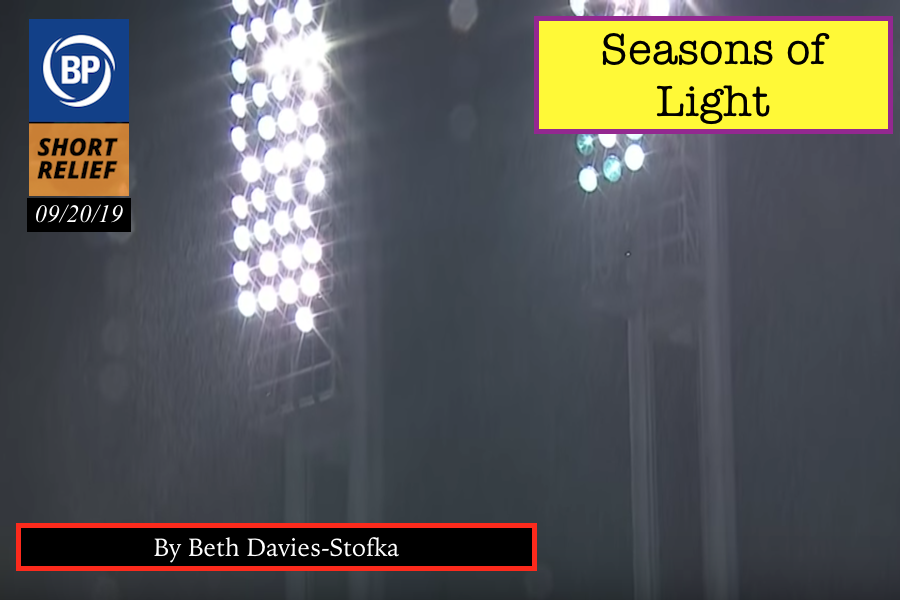
“It’s not getting better and I don’t think it can.” I ached with her sadness. “What about Christmas?” I asked. She loved the season of light. She would wander around town for hours, taking in the bright holiday displays in the streets and bars. When I first met her, she would trace those displays in her very soul, and return home so radiant that I married her. Now she gazed out the window, a thousand miles away. She was slow to reply. “It looks like rain,” she said.
The deeper we went into September, the more I worried. That morning, I’d found her poring over the standings. “Look,” she said. “Only eleven days left in the regular season.” As in years past, she was crossing off the days on her calendar, ranking key series, exploring possibilities, making predictions. I knew she’d give herself over to the television that weekend to watch the most promising games. She would absorb herself in the rhythms of fortune and luck. But I knew she would do it without joy. The joy of years past was gone.
“Let’s go to tonight’s game,” I’d suggested. In twenty years of marriage, I’d never seen her as happy as she was at the ballpark. “Okay,” she’d said, and so here we were, sitting on the train, the park coming into view. “Everybody leaves,” she said. I wasn’t hurt. Anything could reignite her fitful fears of abandonment. Especially the cruelty of a dying mother. I only wanted to sit with her patiently. I would never be the one to leave.
I squeezed her hand. “Baseball does the same thing every year,” I said. “You can count on it. Let yourself count on it.” She squeezed my hand. “What will I do the day after the World Series?” “You’ll count on me,” I said. “I’m not going anywhere.” I looked at her face in the window, troubled. It looked like rain.
As the team took the field, I gave her a raincoat; I’d brought the blue one she got in Dublin. One pitch, two pitches, the game was underway and she never sat down. I watched her watching the game, her body swaying gently in blue. She watched a strike out, a walk, a double play. She watched balls fly into mitts in right field. She listened to the organ and traded stats with our neighbors. When the rain began to fall, it sparkled in the stadium lights. It sparkled on her cheeks. I brushed a drop away and she smiled.
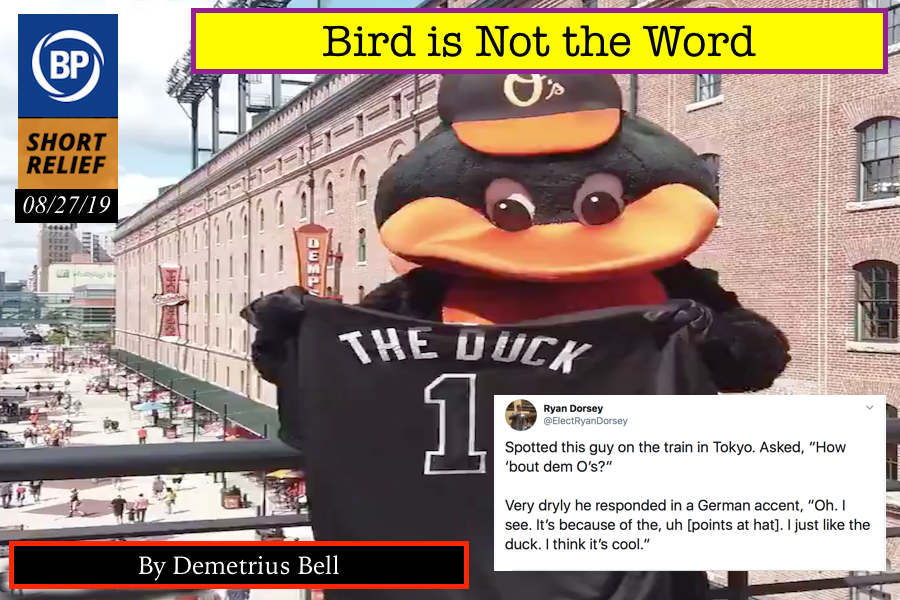
While the all-black and all-white uniforms for Players’ Weekend may have been a bit of a dud, they still had the cool element of the nicknames being on the back of the jersey. It was extremely difficult to make out the lettering and numbering on the white jerseys but on the flipside, it actually wasn’t too much of a problem on the black jerseys.
That ended up working out for the best, since the Orioles were in black and the most important nickname was being worn by The Oriole Bird mascot. If you’re blissfully unaware of what’s going on here, then you should just know that not everybody identifies the famed Cartoon Bird logo as an Oriole. In fact, if you ask someone overseas on public transportation what they think the bird is, chances are they will tell you that it’s a duck.
So, I decided to do some research of my own. I figured that if I was going to get a definitive identification of this orange-and-black bird, I was going to ask the smartest people I know: My two nephews. One is six and the other is four, and every time I’m with them they never fail to amaze me with whatever gem they bestow upon me on that particular day. If anybody could lay down the law and end the debate as to what the bird looks like, they would. So I made it plain and simple: Guess what this bird is.

Four-year old: “An eagle, because of that beak.”
Six-year old: “A penguin.”
There you have it. It’s either an eagle or a penguin. Definitely not an oriole. Just for fun, I decided to ask them about the other birds in baseball: the Blue Jays and the Cardinals.

Four-year old: “An eagle wearing a soft star.”
Six-year old: “A bluebird.”

Four-year old: “A redbird”
Six-year old: “A red robinhood.”
It turns out that they treated this like a guessing game and wanted to know who “won” the game because although they’re young, they are the most competitive children I have ever encountered. I gave them each one point since you really can’t argue that a Blue Jay isn’t a blue bird and a Cardinal isn’t a red bird. I had to put my foot down and give them no points for the Oriole answer which meant that the game ended in a tie. However, I respected their opinion and they respected my judgment. This is how society should function.
With that being said, I now understand why the dude on the other side of the planet thought the Oriole was a duck. The experts thought it was either a penguin or even an eagle. The Cartoon Bird may be a legendary bird in the eyes of baseball fans but in the eyes of regular people like my nephews, it’s anything that you want it to be.
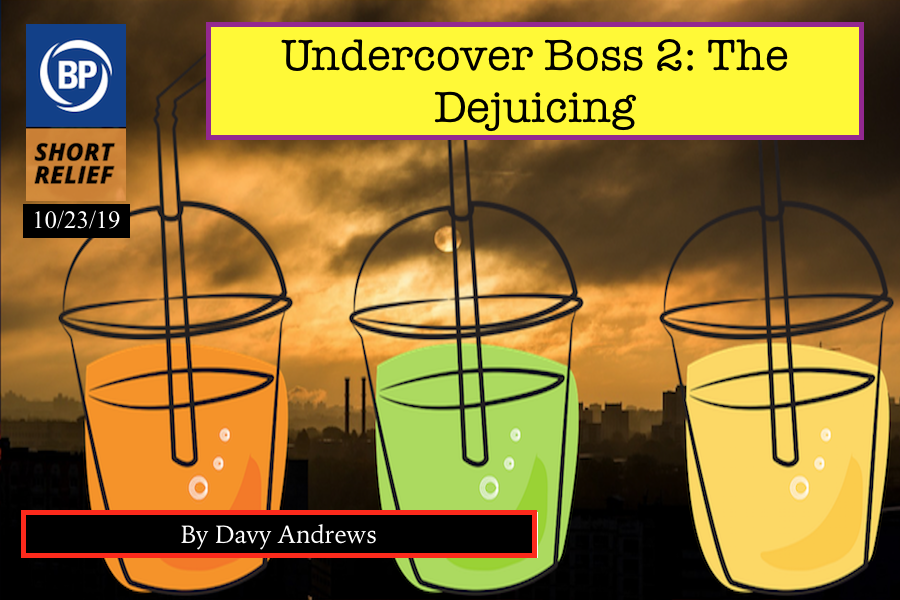
The events from January 2019 could be found here.
September, 2019. Turrialba, Costa Rica. A factory. EMPLOYEE 2 works next to a large bin of finished baseballs. ROB MANFRED jumps unexpectedly out of the bin and baseballs fly everywhere.
MANFRED: We need to dejuice these balls!
EMPLOYEE 2: OH MY GOD! Have you been there all day? I was really hoping I’d never see you again, Rob.
MANFRED: You know my name?
EMPLOYEE 2: Rob Manfred, Commissioner of Major League Baseball. I googled you! Are you aware that people don’t like you?
MANFRED: I missed you too.
EMPLOYEE 2: I juiced the baseballs just like you said.
MANFRED: And you did a great job.
EMPLOYEE 2: Thank you.
MANFRED: In fact, you did such a great job that it ruined my life.
EMPLOYEE 2: I am glad that I could be of service.
MANFRED: The game is totally distorted; pop-ups are going for home runs.
EMPLOYEE 2: That means nothing to me. You know I don’t follow baseball, Rob. I’m a bocce guy.
MANFRED: Bocce? You make baseballs for a living, but the only sport you like is bocce?
EMPLOYEE 2: Sport of kings, my friend.
MANFRED: Incorrect. So now we need to dejuice the baseballs.
EMPLOYEE 2: Wait, what?
MANFRED: Dejuice them. Unjuice them.
EMPLOYEE 2: You want to add juice?
MANFRED: No. I want the opposite of that.
EMPLOYEE 2: Say you’re juicing an orange; that’s removing the juice. Dejuicing sounds like adding juice.
MANFRED: I want you to remove the juice.
EMPLOYEE 2: Isn’t that fun? How juice and unjuice mean the same thing, like flammable and inflammable? You know what’s juicy? Language.
MANFRED: We want to de-unjuice them. We want dead baseballs.
EMPLOYEE 2: That’s easy enough. But why?
MANFRED: Remember when I asked you to juice the balls? Remember how I traveled by stealth? Remember how nary a soul knew my true identity?
EMPLOYEE 2: I remember a fake moustache.
MANFRED: Well the secret plan worked perfectly, except that the secret was glaringly obvious and everyone noticed it instantly. You did your job too well.
EMPLOYEE 2: Again, I accept your congratulations. More importantly, what happened to that monster, Justin Verlander? Did he suffer? Did the juiced baseballs cause him pain? Unbearable, unfathomable pain?
MANFRED: Well, actually.
EMPLOYEE 2: Yes?
MANFRED: He adjusted pretty nicely.
EMPLOYEE 2: He WHAT?
MANFRED: He was, by some measures, the best pitcher in the league. He’s up for an award.
EMPLOYEE 2: You told me that he hated juicy baseballs. You told me that if I juiced the baseballs it would ruin his life.
MANFRED: I mean, he was probably annoyed.
EMPLOYEE 2: Annoyed?
MANFRED: Moderately peeved. You peeved Justin Verlander. What more could you want?
EMPLOYEE 2: I could want to destroy him. I could want to bathe in his blood. I could salsa dance to the anguished lamentations of his wife.
MANFRED: Kate Upton?
EMPLOYEE 2: What?
MANFRED: His wife. She’s Kate Upton, the model.
EMPLOYEE 2: Oh, I loved her in that movie, the one about the heist in the tower.
MANFRED: Tower Heist?
EMPLOYEE 2: I don’t remember the name.
MANFRED: We need to undo what you did. People are asking questions. I had to commission a whole scientific study.
EMPLOYEE 2: That sounds fun. Did you use empirical evidence to provide clarity and objective answers?
MANFRED: Of course not. We muddied the waters. Threw some physics terms out there. Confused. Obfuscated.
EMPLOYEE 2: Very scientific.
MANFRED: So we’re going to unjuice—shut up—deaden them. Everything goes back to normal. And people stop hating me for the juicy baseballs.
EMPLOYEE 2: They just go back to hating you for other reasons.
MANFRED: Exactly.
EMPLOYEE 2: You said everyone noticed the juiced baseballs. If we deaden them, won’t they notice that too? Wouldn’t it be smarter to wait until next year? Don’t the important games happen at the end of the year? That’s how my bocce league works. Seems like a bad time to drastically change the mechanics of the game. If they did that during the bocce playoffs, people would lose it.
MANFRED: Please stop talking about bocce.
EMPLOYEE 2: Bocce.
MANFRED: No one will notice.
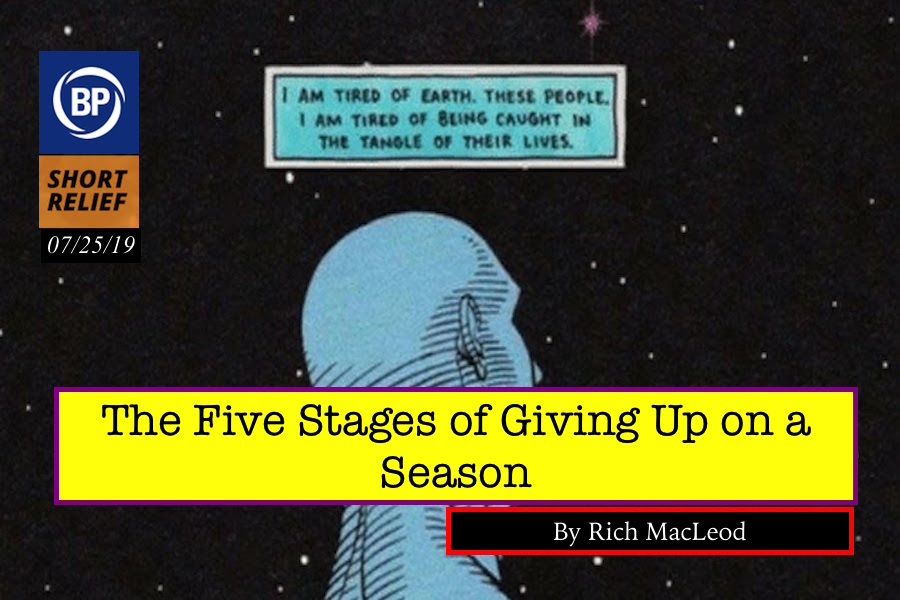
It’s something each and every one of us has experienced at one point or another. It doesn’t matter where your loyalties lie—you know this feeling. Whether it be in June, the dog days of August or before the 162-game marathon even starts, every single baseball fan has been faced with the crushing realization that their baseball season has come to a bitter end.
But because of our inexplicable attachments to these ever-changing entities, it’s never as simple as just saying “alright, that’s it.” It’s more complicated than that. This is baseball, after all.
When experiencing something like a death in the family or going through a difficult break-up, most people go through what is commonly known as the Five Stages of Grief.
Denial. Anger. Bargaining. Depression. And finally, Acceptance.
Much lower stakes aside, waving the white flag on a baseball season isn’t all that different in principle. If you’re a fan of a select few teams, you’ll be in the lucky minority that won’t have to experience this for quite a while. For the rest of us poor saps destined for insignificance in 2019, here are the five stages you should prepare for (or may already be going through right now).
THE “THEY’RE STILL IN IT” STAGE
Okay, your team isn’t playing all that well. They’re struggling to put consistent efforts together. When the pitching is good, the hitting sucks. When the hitting is good, the pitching can’t get an out. But look at the standings—they’re right there.
Things aren’t even close to getting away from them. A couple good series strung together and bam, you’re in first place. Things are gonna be okay.
THE “TWEET THROUGH THE PAIN” STAGE
God damn, things really got out of hand fast. You’re pissed off; rightfully so. The team still isn’t playing well. They’ve lost a few series in a row, some to teams they probably should’ve beaten. Maybe there’s a couple of blown leads by your bullpen, too, just to add to the sting of it all.
Your fingers hover over the keyboard. You know you shouldn’t, but you can’t stop yourself. You’re officially mad online.
Every few minutes you think of a new way to slander your team. It starts with a statistic to show off how truly bad things have gotten. Okay, now you’ve got a slam dunk pithy comment calling back to something one of the players or coaches said earlier in the year. Maybe you’ll even snap at a beat writer or two for not being critical enough. Yeah, that’ll show ‘em.
THE “IF THIS, THEN THAT” STAGE
Alright, let’s break this down. You know the team was playing like garbage for over a month and the standings aren’t where you want them to be but they just won two games in a row. Two is more than one and more than one is a streak. This is the beginning of the run. This is how all great sports stories begin.
All they need is for every injured player on our team to come back, every underperforming player to turn things around and every overperforming player to maintain the course and if the other teams ahead of us in the race falter a little bit we’re back in this thing baby.
Tweet out that classic team rallying cry because this thing ain’t over yet.
THE “I DON’T WANNA TALK ABOUT IT” STAGE
Yeah, you were wrong. This thing is over.
Your friends who are fans of other teams want to check the pulse of your fandom, but you’re not here for any of that. You’re tweeting less. You’re not as eager to watch the games on TV anymore and if you do manage to turn them on, it’s conditional. Maybe if they’re winning or your ace is pitching or our rookie phenom is doing rookie phenom stuff, but overall, you’re losing that drive. Whoops, the rookie went yesterday. Missed it.
Your anger is subsiding and now you just want to forget that you’ve wasted the last few months putting your heart and soul and time into a group of 25 strangers that has delivered nothing but late nights and disappointment.
THE “APATHETIC FREEDOM” STAGE
More time has passed now. You haven’t sat down and watched a full game for quite awhile. You’re not even sure what the standings are anymore, but you know it isn’t good.
That’s because something painfully beautiful has occurred: you don’t care anymore.
Sure, you’d like to see your team win some games, your favorite players perform well, your young guys develop. Maybe there’s even something as cool as a no-hitter or cycle or something to give you something to enjoy in the midst of all this mediocrity. But you’re not living and dying with every pitch anymore. You’re not cursing out your radio or television or smart phone when your team gives up a five-spot or your manager does something you might not agree with.
You’re free now. And while the constraints of fandom can still be heard clattering around in the distance behind you, you’re not being held back by those chains anymore. Not this year, anyway.
The year will end and as with everything, time will heal your wounds. Even if the team doesn’t have the offseason you’re hoping for, even if you’re furious with the decisions they’ve made over the preceding six months or so, Opening Day will come and hope yet again springs eternal.
Despite any semblance of logic or reason, most of us will begin the process of dreaming big. The cycle will complete itself and there you’ll be, exposed and ready to be hurt once more.
Thank you for reading
This is a free article. If you enjoyed it, consider subscribing to Baseball Prospectus. Subscriptions support ongoing public baseball research and analysis in an increasingly proprietary environment.
Subscribe now